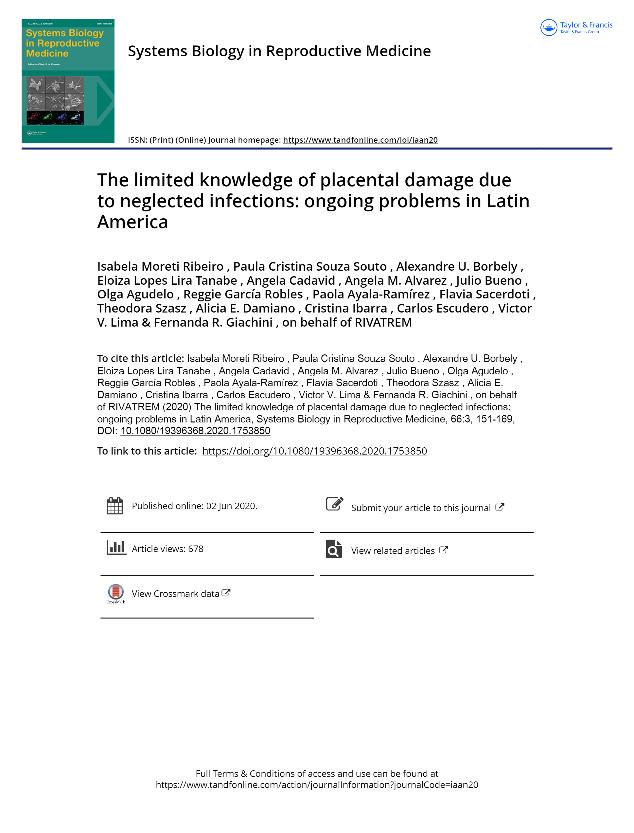Artículo
The limited knowledge of placental damage due to neglected infections: ongoing problems in Latin America
Moreti Ribeiro, Isabel; Souza Souto, Paula Cristina; Borbely, Alexandre U.; Lopez Lira Tanabe, Eloiza; Cadavid, Angela; Alvarez, Angela M.; Bueno, Julio; Agudelo, Olga; Garcia Robles, Reggie; Ayala Ramirez, Paola; Sacerdoti, Flavia ; Szasz, Theodora; Damiano, Alicia Ermelinda
; Szasz, Theodora; Damiano, Alicia Ermelinda ; Ibarra, Cristina Adriana
; Ibarra, Cristina Adriana ; Escudero, Carlos; Lima, Víctor V.; Giachini, Fernanda R.
; Escudero, Carlos; Lima, Víctor V.; Giachini, Fernanda R.
 ; Szasz, Theodora; Damiano, Alicia Ermelinda
; Szasz, Theodora; Damiano, Alicia Ermelinda ; Ibarra, Cristina Adriana
; Ibarra, Cristina Adriana ; Escudero, Carlos; Lima, Víctor V.; Giachini, Fernanda R.
; Escudero, Carlos; Lima, Víctor V.; Giachini, Fernanda R.
Fecha de publicación:
06/2020
Editorial:
Informa Healthcare
Revista:
Systems Biology In Reproductive Medicine
ISSN:
1939-6368
Idioma:
Inglés
Tipo de recurso:
Artículo publicado
Clasificación temática:
Resumen
The placenta works as a selective barrier, protecting the fetus from potential infections that may affect the maternal organism during pregnancy. In this review, we will discuss several challenging infections that are common within Latin American countries and that may affect the maternal-fetal interface and pose risks to fetal development. Specifically, we will focus on emerging infectious diseases including the arboviruses, malaria, leishmaniasis, and the bacterial foodborne disease caused by Shiga toxinproducing Escherichia coli. We will also highlight some topics of interest currently being studied by research groups that comprise an international effort aimed at filling the knowledge gaps in this field. These topics address the relationship between exposure to microorganisms and placental abnormalities, congenital anomalies, and complications of pregnancy.
Archivos asociados
Licencia
Identificadores
Colecciones
Articulos(IFIBIO HOUSSAY)
Articulos de INSTITUTO DE FISIOLOGIA Y BIOFISICA BERNARDO HOUSSAY
Articulos de INSTITUTO DE FISIOLOGIA Y BIOFISICA BERNARDO HOUSSAY
Citación
Moreti Ribeiro, Isabel; Souza Souto, Paula Cristina; Borbely, Alexandre U.; Lopez Lira Tanabe, Eloiza; Cadavid, Angela; et al.; The limited knowledge of placental damage due to neglected infections: ongoing problems in Latin America; Informa Healthcare; Systems Biology In Reproductive Medicine; 66; 3; 6-2020; 151-169
Compartir
Altmétricas



